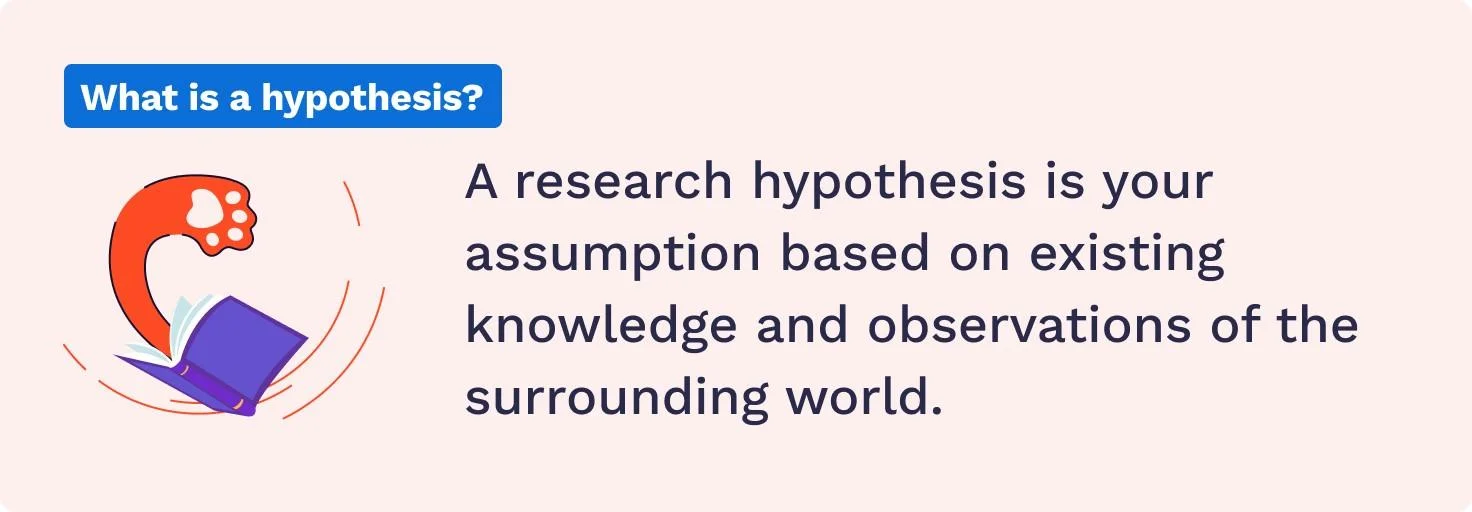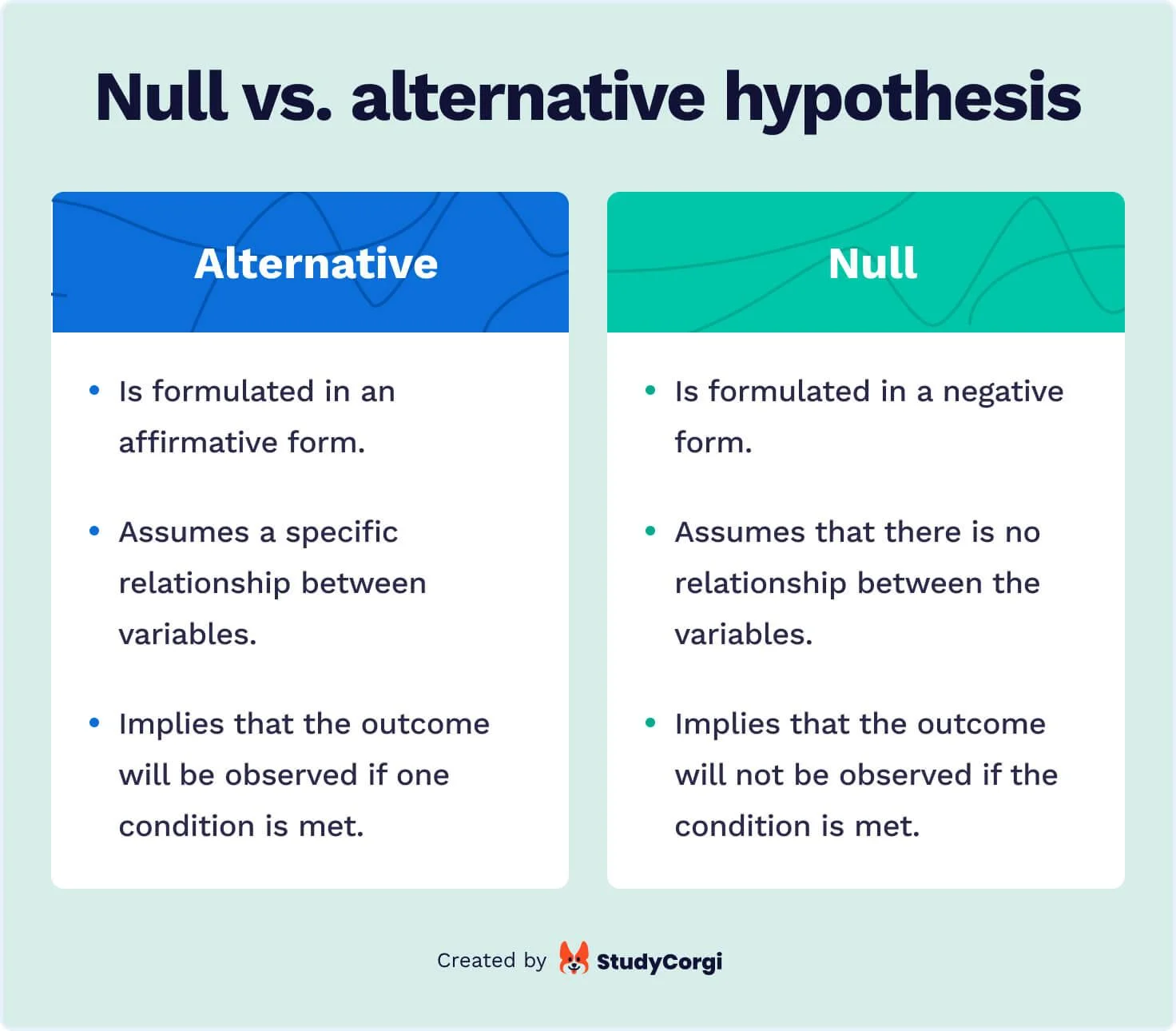👍 Hypothesis Maker: the Benefits
Here are the key benefits of this null and alternative hypothesis generator.
🔎 Hypothesis Generator: How to Use It?
Whenever you conduct research, whether a 5-paragraph essay or a more complex assignment, you need to create a hypothesis for this study.
Clueless about how to create a good hypothesis?
No need to waste time and energy on this small portion of your writing process! You can always use our hypothesis creator to get a researchable assumption in no time.
To get a ready-made hypothesis idea, you need to:
- State the object of your study
- Specify what the object does
- Lay out the outcome of that activity
- Indicate the comparison group
Once all data is inserted into the fields, you can press the “Generate now” button and get the result from our hypothesis generator for research paper or any other academic task.
🕵️ What Is a Research Hypothesis?
A hypothesis is your assumption based on existing academic knowledge and observations of the surrounding natural world.

It also involves a healthy portion of intuition because you should arrive at an interesting, commonsense question about the phenomena or processes you observe.
The traditional formula for hypothesis generation is an “if…then” statement, reflecting its falsifiability and testability.
What do these terms mean?
- Testability means you can formulate a scientific guess and test it with data and analysis.
- Falsifiability is a related feature, allowing you to refute the hypothesis with data and show that your guess has no tangible support in real-world data.
For example, you might want to hypothesize the following:
If children are given enough free play time, their intelligence scores rise quicker.
You can test this assumption by observing and measuring two groups – children involved in much free play and those who don’t get free play time. Once the study period ends, you can measure the intelligence scores in both groups to see the difference, thus proving or disproving your hypothesis, which will be testing your hypothesis. If you find tangible differences between the two groups, your hypothesis will be proven, and if there is no difference, the hypothesis will prove false.
What Is the Difference between Prediction and Hypothesis?
A prediction is your forecast about the outcome of some activities or experimentation. It is a guess of what will happen if you perform some actions with a specific object or person. A hypothesis is a more in-depth inquiry into the way things are related. It is more about explaining specific mechanisms and relationships.
What Makes a Good Hypothesis?
A strong hypothesis should indicate the dependent and independent variables, specifying the relationship you assume between them. You can also strengthen your hypothesis by indicating a specific population group, an intervention period, and the context in which you’ll hold the study.
Null and Alternative Hypothesis
As a rule, hypotheses are presented in pairs in academic studies, as your scientific guess may be refuted or proved. Thus, you should formulate two hypotheses – a null and alternative variant of the same guess – to see which one is proved with your experiment.

The alternative hypothesis is formulated in an affirmative form, assuming a specific relationship between variables. In other words, you hypothesize that the predetermined outcome will be observed if one condition is met.
Watching films before sleep reduces the quality of sleep.
The null hypothesis is formulated in a negative form, suggesting that there is no association between the variables of your interest. For example:
Watching films before sleep doesn’t affect the quality of sleep.
⚗️ Creating a Hypothesis: the Key Steps
The development and testing of multiple hypotheses are the basis of the scientific method.
Without such inquiries, academic knowledge would never progress, and humanity would remain with a limited understanding of the natural world.
How can you contribute to the existing academic base with well-developed and rigorously planned scientific studies? Here is an introduction to the empirical method of scientific inquiry.
Step #1: Observe the World Around You
Look around you to see what’s taking place in your academic area. If you’re a biology researcher, look into the untapped biological processes or intriguing facts that nobody has managed to explain before you.
What’s surprising or unusual in your observations? How can you approach this area of interest?
That’s the starting point of an academic journey to new knowledge.
Step #2: Ask Questions
Now that you’ve found a subject of interest, it’s time to generate scientific research questions.
A question can be called scientific if it is well-defined, focuses on measurable dimensions, and is largely testable.
Some hints for a scientific question are:
- What effect does X produce on Y?
- What happens if the intensity of X’s impact reduces or rises?
- What is the primary cause of X?
- How is X related to Y in this group of people?
- How effective is X in the field of C?
As you can see, X is the independent variable, and Y is the dependent variable.
This principle of hypothesis formulation is vital for cases when you want to illustrate or measure the strength of one variable’s effect on the other.
Step #3: Generate a Research Hypothesis
After asking the scientific question, you can hypothesize what your answer to it can be.
You don’t have any data yet to answer the question confidently, but you can assume what effect you will observe during an empirical investigation.
For example, suppose your background research shows that protein consumption boosts muscle growth.
In that case, you can hypothesize that a sample group consuming much protein after physical training will exhibit better muscle growth dynamics compared to those who don’t eat protein. This way, you’re making a scientific guess based on your prior knowledge of the subject and your intuition.
Step #4: Hold an Experiment
With a hypothesis at hand, you can proceed to the empirical study for its testing. As a rule, you should have a clearly formulated methodology for proving or disproving your hypothesis before you create it. Otherwise, how can you know that it is testable? An effective hypothesis usually contains all data about the research context and the population of interest.
For example:
Marijuana consumption among U. S. college students reduces their motivation and academic achievement.
- The study sample here is college students.
- The dependent variable is motivation and academic achievement, which you can measure with any validated scale (e.g., Intrinsic Motivation Inventory).
- The inclusion criterion for the study’s experimental group is marijuana use.
- The control group might be a group of marijuana non-users from the same population.
- A viable research methodology is to ask both groups to fill out the survey and compare the results.
Step #5: Analyze Your Findings
Once the study is over and you have the collected dataset, it’s time to analyze the findings.
The methodology should also delineate the criteria for proving or disproving the hypothesis.
Using the previous section’s example, your hypothesis is proven if the experimental group reveals lower motivational scores and has a lower GPA. If both groups’ motivation and GPA scores aren’t statistically different, your hypothesis is false.
Step #6: Formulate Your Conclusion
Using your study’s hypothesis and outcomes, you can now generate a conclusion. If the alternative hypothesis is proven, you can conclude that marijuana use hinders students’ achievement and motivation. If the null hypothesis is validated, you should report no identified relationship between low academic achievement and weed use.
Thank you for reading this article! Note that if you need to conduct a business analysis, you can try our free tools: SWOT, VRIO, SOAR, PESTEL, and Porter’s Five Forces.
Updated: